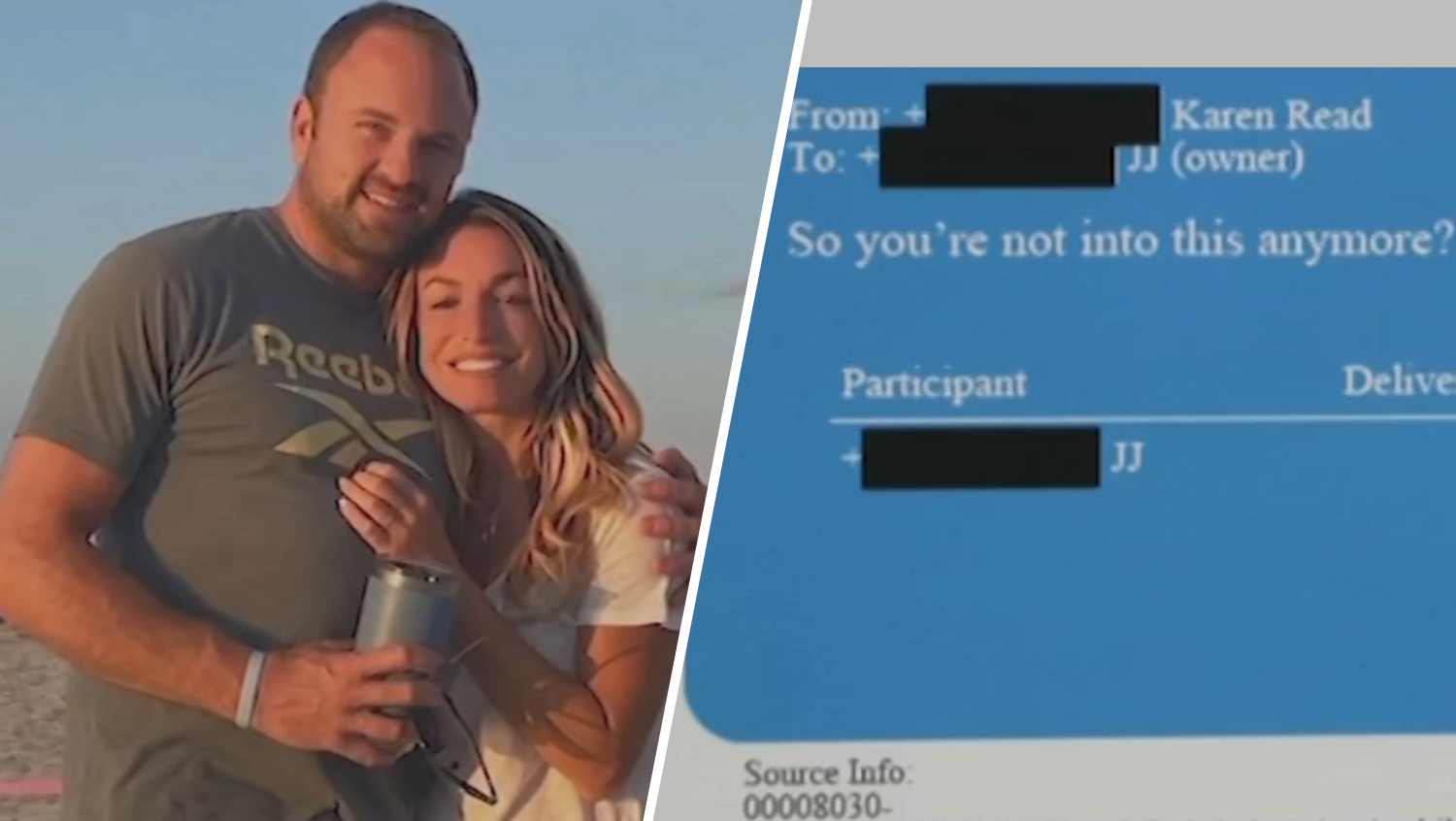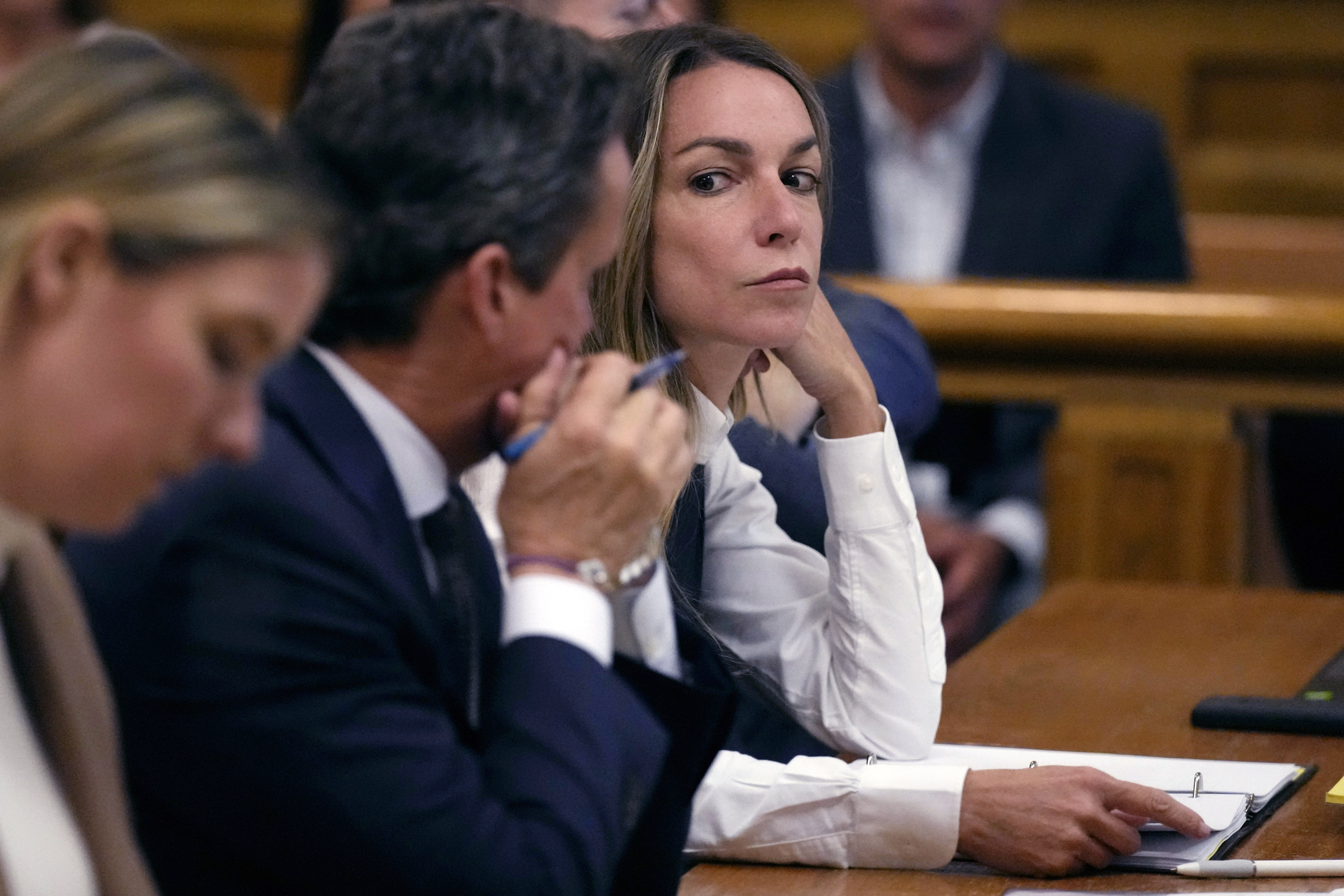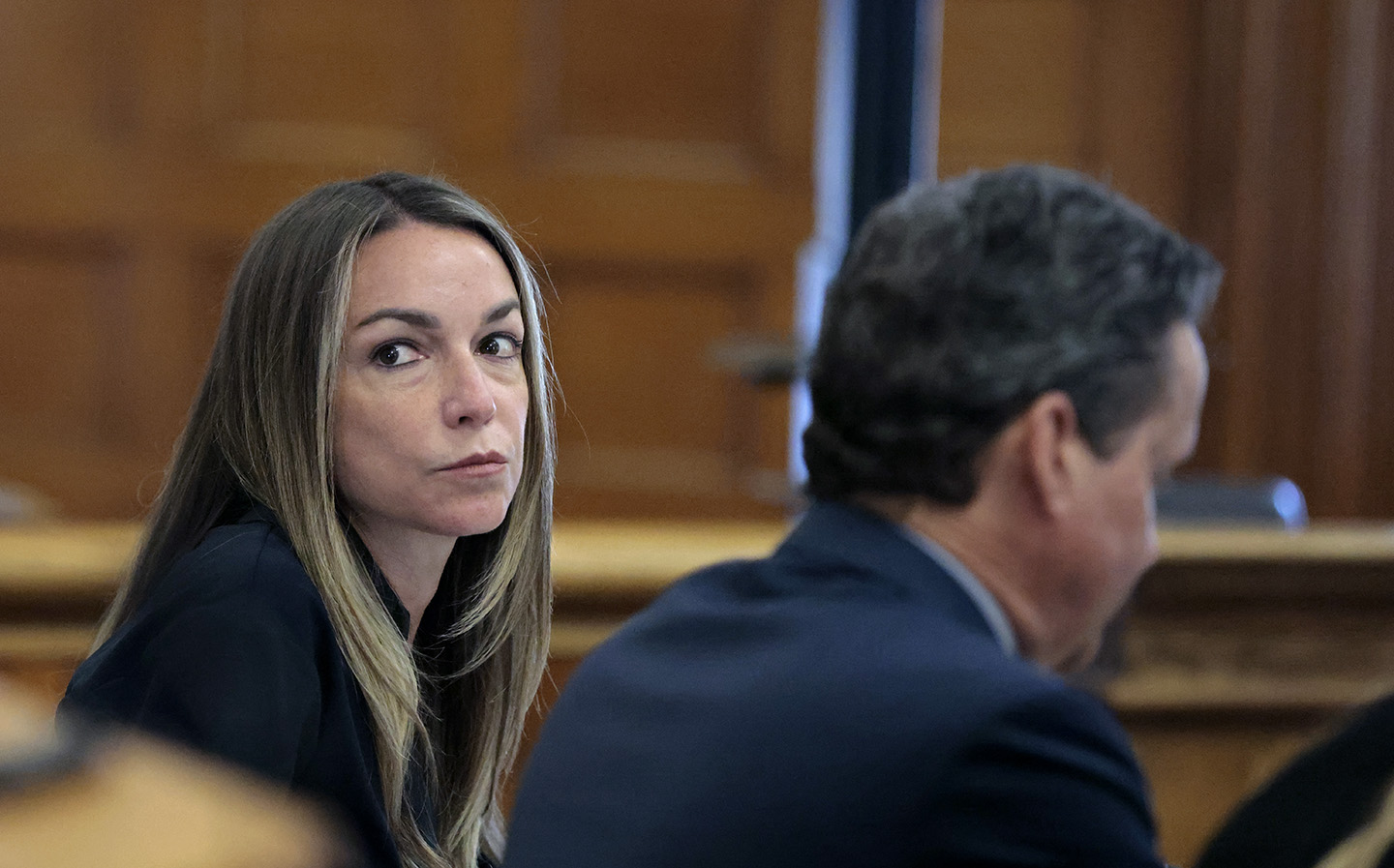Critical pieces of testimony were shared Thursday in the Karen Read murder trial, with the jury hearing eight voicemails Read left for John O'Keefe, her Boston police officer boyfriend, as well as testimony on O'Keefe's location and cause of death.
Read is accused of striking John O'Keefe, her Boston police officer boyfriend, with her SUV and leaving him for dead in a snowbank in Canton, Massachusetts, in the early morning hours of Jan. 29, 2022.
WATCH ANYTIME FOR FREE
>Stream NBC10 Boston news for free, 24/7, wherever you are. |
Prosecutors say Read dropped O'Keefe off at a house party hosted by a fellow officer after a night of drinking, struck him while making a three-point turn and then drove away. She has pleaded not guilty, and her defense team argues she has been framed by someone who beat O'Keefe to death inside the home and that the homeowner's relationship with local and state police tainted their investigation.
Get updates on what's happening in Boston to your inbox. Sign up for our >News Headlines newsletter.
Watch the Karen Read trial live on nbcboston.com, NECN, NBC Boston streaming platforms (including Roku, Peacock and Samsung TV) and NBC10 Boston's YouTube page. Every night of the trial at 7 p.m., come back for analysis and more.
Email questions to canton.confidential@nbcuni.com.
Messages between Read and O'Keefe were revealed during the testimony of Massachusetts State Police forensic expert Trooper Nicholas Guarino on Monday. Court was in session Tuesday, but jurors were not present as Judge Beverly Cannone heard from three potential defense witnesses -- a dog bite expert and two accident reconstruction experts -- before deciding if she will allow them to testify.
She made her ruling at the start of the session on Thursday, handing the defense a limited victory.
Guarino returned was the first witness back on the stand Thursday; the defense team has not yet had a chance to cross examine him.
Guarino spoke to the veracity of the eight voicemails, some of which were vulgar, that Read left O'Keefe between 12:36 a.m., when her phone indicated she arrived back at O'Keefe's house, and 6:08 a.m., when she and two other people were with O'Keefe's body outside the home on Fairview Road where she'd dropped him off earlier.
A full day of testimony is expected Thursday, followed by a half day of testimony on Friday.
The defense team has said it expects to begin calling witnesses as early as this week, and the judge has said jurors should get the case by the end of June. She reiterated Thursday that she thought they'd be deliberating by the end of next week — even extending the schedule on Friday after another hearing, which the court clerk confirmed was for the sentencing of Emmanuel Lopes, was pushed back.
Cannone's ruling on defense's expert witnesses
Recapping Tuesday's hearing, called a voir dire hearing, Cannone said she will allow the defense's dog bite expert, Dr. Marie Russell, to testify on a limited basis. The prosecution had sought to exclude Russell's testimony.
"She'll be allowed only to opine whether or not the marks on John O'Keefe's arm were the result of an animal attack, Cannone said, noting her specialized knowledge in the field.
Russell told the judge and lawyers on Tuesday that she'd reached out to the defense last month after hearing about the ongoing trial.
At least one of the accident reconstruction experts, Daniel Wolfe and Andrew Rentschler of high-profile forensic consulting engineering company ARCCA, will also be allowed to testify.
Wolfe, who specializes in accident reconstruction, got the full OK. But Cannone said that Rentschler, as a biomedical engineer, is not qualified to testify on the medical cause of injuries under Massachusetts law and court precedent.
She said she would hear arguments on that later on, and had the trial continue.
Trooper Guarino testifies about Read's voicemails
Massachusetts State Police forensic expert Trooper Nicholas Guarino was called back to the stand.
He shared texts between Read and Laura Sullivan, a close friend of O'Keefe's who has previously testified in the trial, from after O'Keefe's death.
Guarino was then asked to share texts between Read and O'Keefe, in which she indicated she was going back to her house. The last read, "I'm back in Mansfield. The kids are home alone."
Assistant District Attorney Adam Lally moved on to the phone call record between Read and O'Keefe, which involved more than 50 calls, though there was no indication that the pair spoke.
"There were eight voicemails from Mr. O'Keefe's phone from the 29th until the phone was discovered, all from Ms. Read, no one else," Guarino said. He also noted that Read's phone indicated she connected to the wifi at his house at 12:36 a.m.
All eight voicemails were played for the court — the first was left on O'Keefe's phone a minute after her phone connected to the wifi at his house.
"John, I f------ hate you!" she said in that voicemail.
The second, from 12:42 a.m., only played the sound of undetermined beeps, walking and bumping.
At 12:59, Read left a third voicemail saying, "John, I'm here with your f------ kids. Nobody knows where the f--- you are, you f------ pervert."
The fourth message, at 1:02 a.m., has no content. At 1:11 a.m., she leaves a longer message, screaming that she's with his neice and nephew and again calls him a pervert.
At 1:18 a.m., Read leaves a sixth message, sayig she needs to go home and ending, "You're f------ another girl…you're a f------ loser, f--- yourself!"
The next message, from 5:23 a.m., Read can be heard screaming.
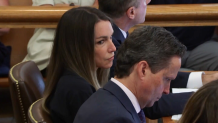
The eighth and final message, from 6:08 a.m., has been played before in the trial. In it, mumbling, screaming and the sound of a vehicle's wipers can be heard — it's from when Read, Jennifer McCabe and Kerry Roberts were at the Fairview Road home, having found O'Keefe's body. Guarino noted someone can be heard on the phone with 911.
Read also made three calls to a contact listed as her mother, at 1:10 a.m., 4:40 a.m. and 4:42 a.m. — the last of which was answered, Guarino testified. There was also a call placed to a contact listed as "dad."
John O'Keefe's phone, GPS data discussed
Lally turned to the location data from O'Keefe's phone, which Guarino analyzed during the investigation.
In previous statements in court, the prosecution and defense have told vastly different stories based on the data — the defense has alleged that data on the phone indicated O'Keefe went inside the home.
Guarino said investigators couldn't get GPS locations from Read's phone, which could indicate the location was off.
Guarino discussed the data he pulled, including from the phone's Apple Health and Waze apps. He said the data indicated O'Keefe was still driving to the home on Fairview Road when his phone indicated he was walking up and down stairs and taking about 80 steps.
The trooper noted that the phone's data didn't record any speed from 12:25 p.m. to 6:15 a.m. — "there's no real speed registered until the phone is found the next morning."
He also described mapping the scene, and that the investigative team found his phone tracked being within about three feet from where O'Keefe's body was found, about 72 feet from the door.
Asked if the GPS data pulled from O'Keefe's phone ever showed where it was possible he could be in the home on Fairview Road, Guarino said it was wide enough for about three seconds, and that he would have had to have made it into the house at a speed of about 32 mph, then right back out. He attributed that instead to "just the degree of accuracy from the GPS signal."
Prosecution tries to introduce Read Google search, 'DUI attorneys'
After the lunch break, before Guarino returned to the stand, prosecutors moved to introduce a new piece of evidence in the case: a Google search Read allegedly made the afternoon after O'Keefe's death for the phrase, "DUI attorneys."
Defense attorney David Yannetti countered that the search was made eight minutes after Read was called by state police investigator Michael Proctor.
"We have a person being contacted by the police and then doing what a citizen has every right to do, which is look for an attorney for representation," he said, adding, "she's presumed to be innocent and she's seeking an attorney to defend that innocence. That's it."
Cannone ruled in favor of the defense, but noted that, while Lally can't bring up the search himself, but left open the possibility of it becoming part of the trial through a witness.
Defense cross-examines investigator over cellphone data
Guarino finished his testimony shortly afterward, and Yannetti went over a slew of information about the trooper's qualifications and what he did or didn't establish in the reports he wrote.
Yannetti drilled down on when Read's phone connected to the Wi-Fi at her home, 12:36 a.m., which would indicate she was not at the home where O'Keefe's body was found at that point — prosecutors had previously said it was possible she was at the home until 12:45 a.m., and people who were inside were asked about that when they testified.
The lawyer also asked the trooper if it was possible, given the time ranges involved in the data, whether O'Keefe was actually walking upon getting outside of the car — especially if internal phone clocks were off, which Yanetti inquired about. There was some debate on that point, as well as many others, including on the scope of what Guarino investigated.
Yannetti ended his questioning by confirming that Read didn't delete any phone records from the day O'Keefe died, or if she made any Google searches — apparent references to other witnesses who are part of the defense theory of a coverup, and whom Yannetti had asked about.
Given a chance to ask his own follow-up questions, Lally had Guarino confirm that he looks into what other officers bring him, among other things.
Experts discuss O'Keefe's cause of death
The day ended with two experts, Dr. Renee Stonebridge and medical examiner Irini Scordi-Bello, explaining their parts in the investigation.
Stonebridge, who works with Massachusetts' Office of the Chief Medical examiner, examiend O'Keefe's brain, finding hermhorraging with no apparent natural cause. O'Keefe's skull had been fractured.
"These are acute traumatic injuries," she said, adding, "this is due to some type of trauma."
But Stonebridge noted further that she "can't say what type of force or how much force." When Lally asked if they were consistent with a fall and hitting the ground, she said to each, "yes, they can be."
The defense had no questions for her.
Scordi-Bello said O'Keefe's autopsy was done in her department's Cape Cod office, which she was covering because they were short-staffed.
She said the cause of his death was blunt-impact injuries to O'Keefe's head as well as hypothermia, and the manner of death could not be determined — both of which she explained in great detail, along with the nature of O'Keefe's injuries.
She also said that the man's blood alcohol level was found to be 0.21% — nearly three times the legal limit — the other fluids suggested it had been even higher.
His body temperature was measured at 80.1 degrees just before 7 a.m. that morning, which Scordi-Bello characterized as "very hypothermic," far lower than the threshold for hypothermia, 95 degrees. (The average normal human temperature is considered 98.6 degrees.)
Scordi-Bello walked the jury through her exam notes, including a body diagram. Among the injuries, she noted a skull fracture that had other fractures radiating from it.
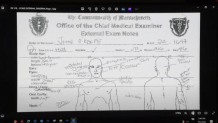
She said that, unlike a gunshot wound to the head, the injuries O'Keefe had would have taken time to lead to his death, as evidenced by the bleeding: "Mr. O'Keefe was likely incapacitated, unable to move into a warmer environment, and then the hypothermia set in."
Scordi-Bello also said that, from the pictures she saw of the crime scene, it didn't appear that O'Keefe moved very far, since the scene wasn't disturbed.
When Lally asked if it appeared the man had been in a major altercation, she noted that she didn't see signs of it. She did see bruising on his hands, but not the knuckles, and there were no broken hand bones or fingernails.
Cannone ended the day's testimony as the prosecution was preparing to discuss photos from O'Keefe's autopsy. She reassured the jury that they were on schedule to finish by next week.

